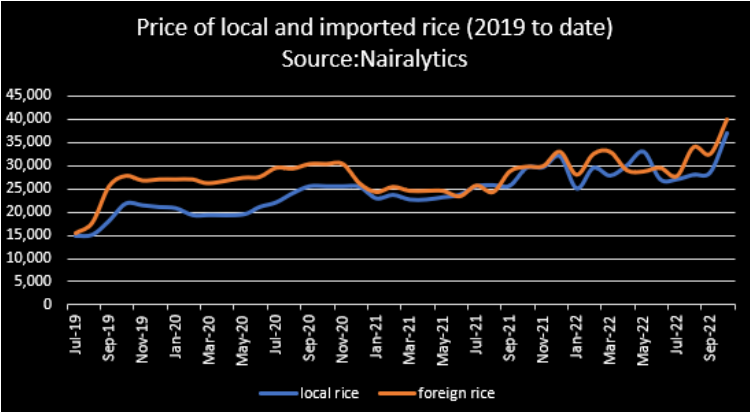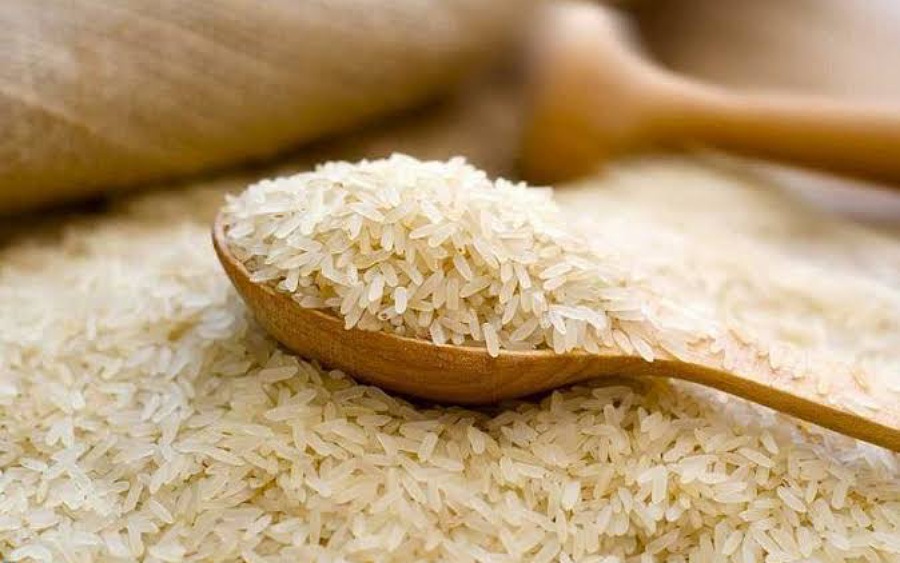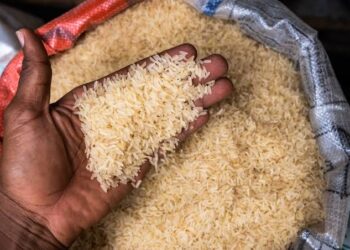As the yuletide season approaches, the price of rice in Nigeria has risen to a record high of N37,000 per 50kg bag on average.
This is as Nigerians have been grappling with sustained food crises over the years due to supply chain disruptions, insecurity, and low farm yields.
The recent flooding incidents in some parts of the country have exacerbated the situation, threatening to send food inflation soaring even more.
Recall that Nigeria is still recovering from the food supply constraints caused by the closure of its land borders in 2019, the Covid-19 pandemic in 2020, insecurity challenges in 2021, and the ripple effect from the Russia-Ukraine war in 2022. And now, the country is dealing with unprecedented flooding incidents in the northern region.
Rice, a major staple in the country, is one of the many food items whose prices have been affected directly.
Last week, Olam Rice Farm, one of Africa’s largest rice farms, reportedly lost over $15 million worth of rice investments as its farm in Nasarawa State was submerged by the rising flood.
The government has attributed the recent flooding in the country to unusually heavy rainfall and climate change, which has now displaced over 1.3 million people and resulted in more than 600 cases of deaths.
The price of rice surged to the highest levels
- The price of a 50kg bag of domestic rice surged to a record high of N37,000 in October 2022 following the incidences of flooding affecting rice farms across the country.
- The price of domestic rice rose from an average of N28,500 recorded in the previous month.
- Similarly, the price of foreign-made rice that sold for an average of N32,500 last month has now touched its highest level at N40,000 in several Lagos markets.
- This is according to data obtained by Nairalytics – the research arm of Nairametrics.

Indeed, the recent upshot in rice prices (21.2% year to date for foreign rice and 15.6% for locally produced rice) is due to the destruction of rice farmlands across the country.
However, while it seems as though the recent flood disaster is the main cause of Nigeria’s looming food crisis, Nairametrics will like to take into consideration some recent events and factors that have also contributed to the problem.
In a conversation with Ibrahim Maigari Ahmadu, the Founder/CEO of agritech startup RiceAfrika Technologies, it was revealed that Nigeria’s food crisis can also be attributed to the following factors:
High demand for rice
- He noted that rice is the most consumed staple in the country due to its most convertible nature. It can be mostly eaten steamed or boiled, and it can also be dried and found in flour. Similarly, it can be used to make beers and liquors.
- Also, rice straws can be used to make paper and be woven into mats, hats, and other products. Ibrahim said that Nigeria plays a fundamental role in food consumption in Africa, noting that “only Lagos State consumes 47 trailers of rice per day, which means 600 bags of rice multiplied by 47 trailers.”
- This shows the magnitude of rice consumed in the country, which Ibrahim estimates at over 8 million MT annually.
Low production
- Nigeria’s inability to meet its domestic demand, despite increasing production over the years, has affected the price of rice. Ahmadu estimated that Nigeria records an annual rice deficit of up to 3.5 million MT which is compensated for by importation and smuggling.
- The expert also highlighted some of the factors that have kept Nigeria’s production below desirable levels despite significant investments, including serious infrastructural deficits, lack of high-yielding seeds, and a lack of agronomic practices.
- He noted that 92% of the farmers in the country make use of manual harvesting. According to him, “It takes about 30 people to work on a single hectare of land manually. Only to harvest 25 bags of rice, while using a machine will take just 30 minutes and harvest 37 bags of rice.”
Insecurity
- Ibrahim Maigari noted that the increased level of insecurity in the northern region of the country has worsened the supply of food in the country. In his words, “insecurity in Nigeria was a recipe for disaster.”
- The rising cases of kidnapping and rural banditry hindered the farmers from accessing their farmlands which has affected supply significantly.
- He however noted that there have been some improvements in the level of security in the country, which should have had some impact on food production before the recent incidence of flooding.
Covid-19/Russia-Ukraine war
- The Covid-19 pandemic, which started in the early part of 2020 in Nigeria caused global food chain disruption, as movement restrictions were placed in major areas of the world.
- Production and distribution of goods were affected by the covid-19 pandemic in most parts of the world, which saw the prices of goods rise to unprecedented levels. The world was about to recover from the pandemic when the Russia-Ukraine war sent the global market into a frenzy.
- The price of crude oil rose to record highs earlier in the year, triggering a global-scale energy and food crisis due to the influence that Russia and Ukraine play in sectors respectively.
- As a result of the rising cost of energy, which saw the price of diesel surge past N800 per litre. The cost of food production has also risen significantly. According to Ibrahim Maigari, water pumping machines, harvester machines, transportation, milling plants, and bag production, all of which depend on petrol or diesel have affected the cost of production.
- He noted that as of last year, transporting a trailer filled with rice from Jalingo in Taraba State to Kaduna used to cost between N500,000 and N600,000 last year. But this has now increased to a minimum of N1.2 million.
- He also added that moving the same amount of rice from Jalingo to Lagos now costs more than N2 million per truck. And “these increases will reflect on the prices of rice eventually.”
Flooding
- The recent incidence of flooding according to Ibrahim Maigari has wiped out over 50% of rice farms in the country and virtually all the rice farms in Jigawa System.
- He added that the system of farming has also enabled the flooding to cause more havoc on Nigeria’s food production. He also mentioned that only a few farms in the country make use of adequate irrigation systems.
- The flooding has also affected other food items important to the livelihood and survival of Nigeria, some of which include, sorghum, maize, and poultry.
- Ibrahim Maigari then projects that the price of domestic rice to surge over N40,000 into the festive period as Nigerians currently do not have the paddy available to produce rice in other to meet demand.
In another conversation with Sola Obadimu, Director General at the Nigerian Association of Chambers of Commerce, Industry, Mines, and Agriculture (NACCIMA), the traders are now panic-buying rice in a bid to hedge against possible inflation as we head into the festive period.
He noted that the flooding has exacerbated Nigeria’s underlying infrastructural problems, bordering around insecurity, weak infrastructure, and persistent inflation rate, causing a surge in the prices of rice. He also added that the depreciation of the local currency has also affected the general prices of goods and services in the country, food included.
Bottom line
Impact-based actions must be taken by the federal and state governments to ensure food security in the country, considering that Nigerians spend over 50% of their household expenditure on food according to the last NBS estimates. This means, if this crisis should linger, it could throw more Nigerians far below the poverty line.























What are we waiting for then?, we need action based program to salvage this terrible situation, only one man 👨 can guarantee that now,that man is no other but Peter Obi, we need him yes we do.